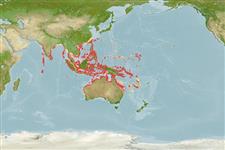Common names from other countries
Environment: milieu / climate zone / depth range / distribution range
Ecologie
marien rifbewoner; diepte 0 - 25 m (Ref. 90102), usually 0 - 20 m (Ref. 27115). Tropical; 25°C - 29°C (Ref. 27115); 27°N - 30°S, 71°E - 171°E
Indo-West Pacific: Maldives, Laccadive Archipelago, India, Sri Lanka, Ogasawara Islands (Japan), eastern Indonesia, New Guinea, Australia, Solomon Islands, Vanuatu, New Caledonia and Philippines; Palau and Yap in Micronesia. Records from Viet Nam (Ref. 2682) is probably Siganus guttatus.
Grootte / Gewicht / Leeftijd
Maturity: Lm ? range ? - ? cm
Max length : 43.0 cm TL mannelijk / geslacht onbekend; (Ref. 9710); common length : 25.0 cm TL mannelijk / geslacht onbekend; (Ref. 9813)
Dorsale stekels (totaal): 13; Dorsale zachte stralen (totaal): 10; Anale stekels 7; Anale zachte stralen: 9; Wervels: 13. This species is distinguished by the following characters: body deep and compressed; greatest body depth 1.9-2.2 in SL; longest dorsal-fin spines 4th to 8th, a little longer (1.1-1.3 times) the last dorsal-fin spine. Colour blue dorsally, silvery below; horizontal golden bronze bands, some broken, running along single sides of trunk, breaking up into spots near bases of dorsal and anal fins and on caudal peduncle, and (except in specimens from South India), spots also on nape; iris silvery and unspotted. Similar with Siganus guttatus in having a diagonal line across cheek from below orbit to corner of mouth, a bright yellow spot about size of orbit on sides at base of last few rays of dorsal fin, and a bluish caudal fin with rows of golden spots which appear as 3 or 4 cross bars on the folded fin. Differs with Siganus guttatus mainly by having mainly lines instead of spots (Ref. 9813, 90102).
Adults inhabit shallow areas, typically 5 m; juveniles common around estuarine areas including mangrove areas and seagrass flats; adults in protected waters such as lagoons and bays in the vicinity of rocky substrata or reefs (resting on rubble or sandy bottoms). Form schools that diminish with age, down to 10-25 fish by adult stage, although congregations may consist of several thousand fish during spawning period. Feed by scraping encrusting algae from beach rock or pavement areas of coral reefs or by browsing on larger coarse algae. Caught mainly with set nets and fixed traps; common in markets where it is sold fresh (Ref. 9813).
Smallest female to spawn was 23 cm, the largest 33 cm SL. Spawning apparently occurs not until the fish is 2 years old.
Woodland, D.J., 1990. Revision of the fish family Siganidae with descriptions of two new species and comments on distribution and biology. Indo-Pac. Fish. (19):136 p. (Ref. 1419)
Status op de Rode Lijst van het IUCN (Ref. 130435)
CITES (Ref. 128078)
Not Evaluated
Gebruik door de mens
Visserij: commercieel; Aquarium: Commercieel
Meer informatie
ReferentiesAquacultuurAquacultuurprofielKweeklijnenGeneticaElectrophoresesErfelijkheidZiektesVerwerkingMassaconversie
Tools
Speciale rapporten
Download XML
Internetbronnen
Estimates based on models
Preferred temperature (Ref.
115969): 24.9 - 29, mean 28 (based on 726 cells).
Fylogenetische diversiteitsindex (Ref.
82804): PD
50 = 0.5000 [Uniqueness, from 0.5 = low to 2.0 = high].
Bayesian length-weight: a=0.01738 (0.01067 - 0.02829), b=3.00 (2.86 - 3.14), in cm Total Length, based on LWR estimates for this species & Genus-body shape (Ref.
93245).
Trofisch niveau (Ref.
69278): 2.0 ±0.00 se; based on food items.
Weerstandsvermogen (Ref.
120179): Hoog, minimale populatieverdubbelingstijd minder dan 15 maanden (K=0.6; tm=2).
Fishing Vulnerability (Ref.
59153): Low to moderate vulnerability (25 of 100).
